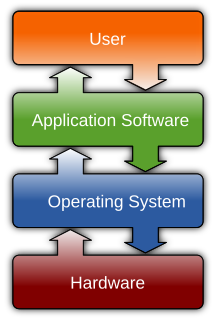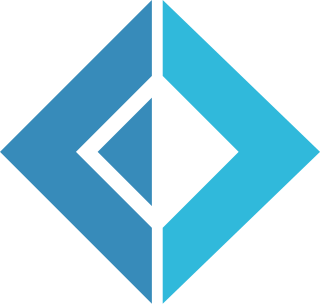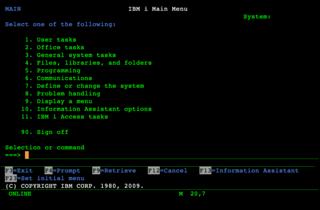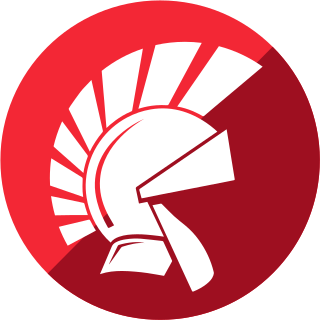
Software is a collection of instructions that tell a computer how to work. This is in contrast to hardware, from which the system is built and which actually performs the work.
In computer science, functional programming is a programming paradigm where programs are constructed by applying and composing functions. It is a declarative programming paradigm in which function definitions are trees of expressions that map values to other values, rather than a sequence of imperative statements which update the running state of the program.

Java is a high-level, class-based, object-oriented programming language that is designed to have as few implementation dependencies as possible. It is a general-purpose programming language intended to let programmers write once, run anywhere (WORA), meaning that compiled Java code can run on all platforms that support Java without the need to recompile. Java applications are typically compiled to bytecode that can run on any Java virtual machine (JVM) regardless of the underlying computer architecture. The syntax of Java is similar to C and C++, but has fewer low-level facilities than either of them. The Java runtime provides dynamic capabilities that are typically not available in traditional compiled languages. As of 2019, Java was one of the most popular programming languages in use according to GitHub, particularly for client–server web applications, with a reported 9 million developers.

A macro in computer science is a rule or pattern that specifies how a certain input should be mapped to a replacement output. Applying a macro to an input is macro expansion. The input and output may be a sequence of lexical tokens or characters, or a syntax tree. Character macros are supported in software applications to make it easy to invoke common command sequences. Token and tree macros are supported in some programming languages to enable code reuse or to extend the language, sometimes for domain-specific languages.

Python is a high-level, interpreted, general-purpose programming language. Its design philosophy emphasizes code readability with the use of significant indentation. Its language constructs and object-oriented approach aim to help programmers write clear, logical code for small- and large-scale projects.
In computing, cross-platform software is computer software that is designed to work in several computing platforms. Some cross-platform software requires a separate build for each platform, but some can be directly run on any platform without special preparation, being written in an interpreted language or compiled to portable bytecode for which the interpreters or run-time packages are common or standard components of all supported platforms.

F# is a functional-first, general purpose, strongly typed, multi-paradigm programming language that encompasses functional, imperative, and object-oriented programming methods. It is most often used as a cross-platform Common Language Infrastructure (CLI) language on .NET, but can also generate JavaScript and graphics processing unit (GPU) code.

D, also known as dlang, is a multi-paradigm system programming language created by Walter Bright at Digital Mars and released in 2001. Andrei Alexandrescu joined the design and development effort in 2007. Though it originated as a re-engineering of C++, D is a profoundly different language —features of D can be considered streamlined and expanded-upon ideas from C++, however D also draws inspiration from other high-level programming languages, notably Java, Python, Ruby, C#, and Eiffel.

IBM i is an operating system developed by IBM for IBM Power Systems. It was originally released in 1988 as OS/400, as the sole operating system of the IBM AS/400 line of systems. It was renamed to i5/OS in 2004, before being renamed a second time to IBM i in 2008. It is an evolution of the System/38 CPF operating system, with compatibility layers for System/36 SSP and AIX applications. It inherits a number of distinctive features from the System/38 platform, including the Machine Interface, the implementation of object-based addressing on top of a single-level store, and the tight integration of a relational database into the operating system.

Delphi is a general-purpose programming language and a software product that uses the Delphi dialect of the Object Pascal programming language and provides an integrated development environment (IDE) for rapid application development of desktop, mobile, web, and console software, currently developed and maintained by Embarcadero Technologies.

A screen reader is a form of assistive technology (AT) that renders text and image content as speech or braille output. Screen readers are essential to people who are blind, and are useful to people who are visually impaired, illiterate, or have a learning disability. Screen readers are software applications that attempt to convey what people with normal eyesight see on a display to their users via non-visual means, like text-to-speech, sound icons, or a braille device. They do this by applying a wide variety of techniques that include, for example, interacting with dedicated accessibility APIs, using various operating system features, and employing hooking techniques.
Quantum programming is the process of assembling sequences of instructions, called quantum programs, that are capable of running on a quantum computer. Quantum programming languages help express quantum algorithms using high-level constructs. The field is deeply rooted in the open-source philosophy and as a result most of the quantum software discussed in this article is freely available as open-source software.

C# is a general-purpose, multi-paradigm programming language. C# encompasses static typing, strong typing, lexically scoped, imperative, declarative, functional, generic, object-oriented (class-based), and component-oriented programming disciplines.

Racket is a general-purpose, multi-paradigm programming language and a multi-platform distribution that includes the Racket language, compiler, large standard library, IDE, development tools, and a set of additional languages including Typed Racket, Swindle, FrTime, Lazy Racket, R5RS & R6RS Scheme, Scribble, Datalog, Racklog, Algol 60 and several teaching languages.

Programming language theory (PLT) is a branch of computer science that deals with the design, implementation, analysis, characterization, and classification of formal languages known as programming languages and of their individual features. It falls within the discipline of computer science, both depending on and affecting mathematics, software engineering, linguistics and even cognitive science. It has become a well-recognized branch of computer science, and an active research area, with results published in numerous journals dedicated to PLT, as well as in general computer science and engineering publications.

OpenCL is a framework for writing programs that execute across heterogeneous platforms consisting of central processing units (CPUs), graphics processing units (GPUs), digital signal processors (DSPs), field-programmable gate arrays (FPGAs) and other processors or hardware accelerators. OpenCL specifies programming languages for programming these devices and application programming interfaces (APIs) to control the platform and execute programs on the compute devices. OpenCL provides a standard interface for parallel computing using task- and data-based parallelism.

The .NET Framework is a proprietary software framework developed by Microsoft that runs primarily on Microsoft Windows. It was the predominant implementation of the Common Language Infrastructure (CLI) until being superseded by the cross-platform .NET project. It includes a large class library called Framework Class Library (FCL) and provides language interoperability across several programming languages. Programs written for .NET Framework execute in a software environment named the Common Language Runtime (CLR). The CLR is an application virtual machine that provides services such as security, memory management, and exception handling. As such, computer code written using .NET Framework is called "managed code". FCL and CLR together constitute the .NET Framework.
Haskell is a general-purpose, statically-typed, purely functional programming language with type inference and lazy evaluation. Designed for teaching, research and industrial application, Haskell has pioneered a number of programming language features such as type classes, which enable type-safe operator overloading. Haskell's main implementation is the Glasgow Haskell Compiler (GHC). It is named after logician Haskell Curry.
An application programming interface (API) is a connection between computers or between computer programs. It is a type of software interface, offering a service to other pieces of software. A document or standard that describes how to build or use such a connection or interface is called an API specification. A computer system that meets this standard is said to implement or expose an API. The term API may refer either to the specification or to the implementation.
Swift is a general-purpose, multi-paradigm, compiled programming language developed by Apple Inc. and the open-source community. First released in 2014, Swift was developed as a replacement for Apple's earlier programming language Objective-C, as Objective-C had been largely unchanged since the early 1980s and lacked modern language features. Swift works with Apple's Cocoa and Cocoa Touch frameworks, and a key aspect of Swift's design was the ability to interoperate with the huge body of existing Objective-C code developed for Apple products over the previous decades. It is built with the open source LLVM compiler framework and has been included in Xcode since version 6, released in 2014. On Apple platforms, it uses the Objective-C runtime library, which allows C, Objective-C, C++ and Swift code to run within one program.












